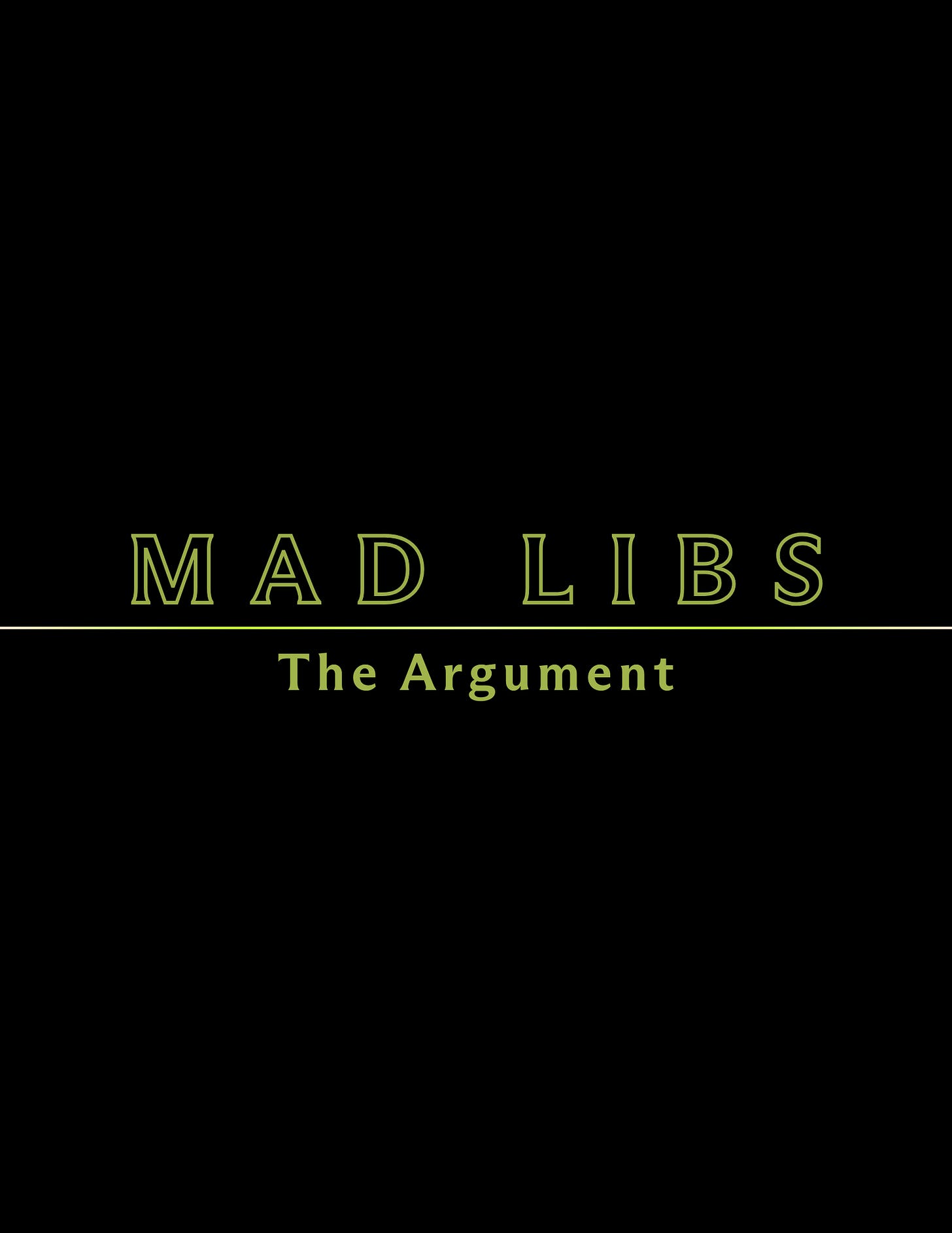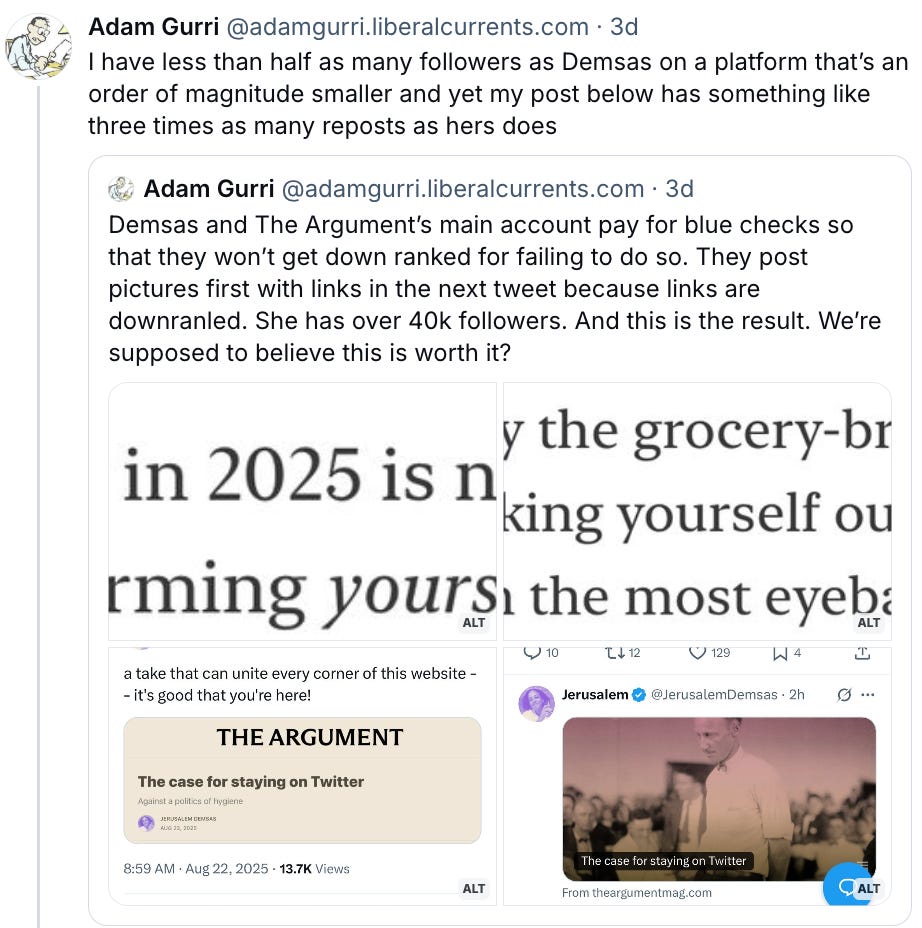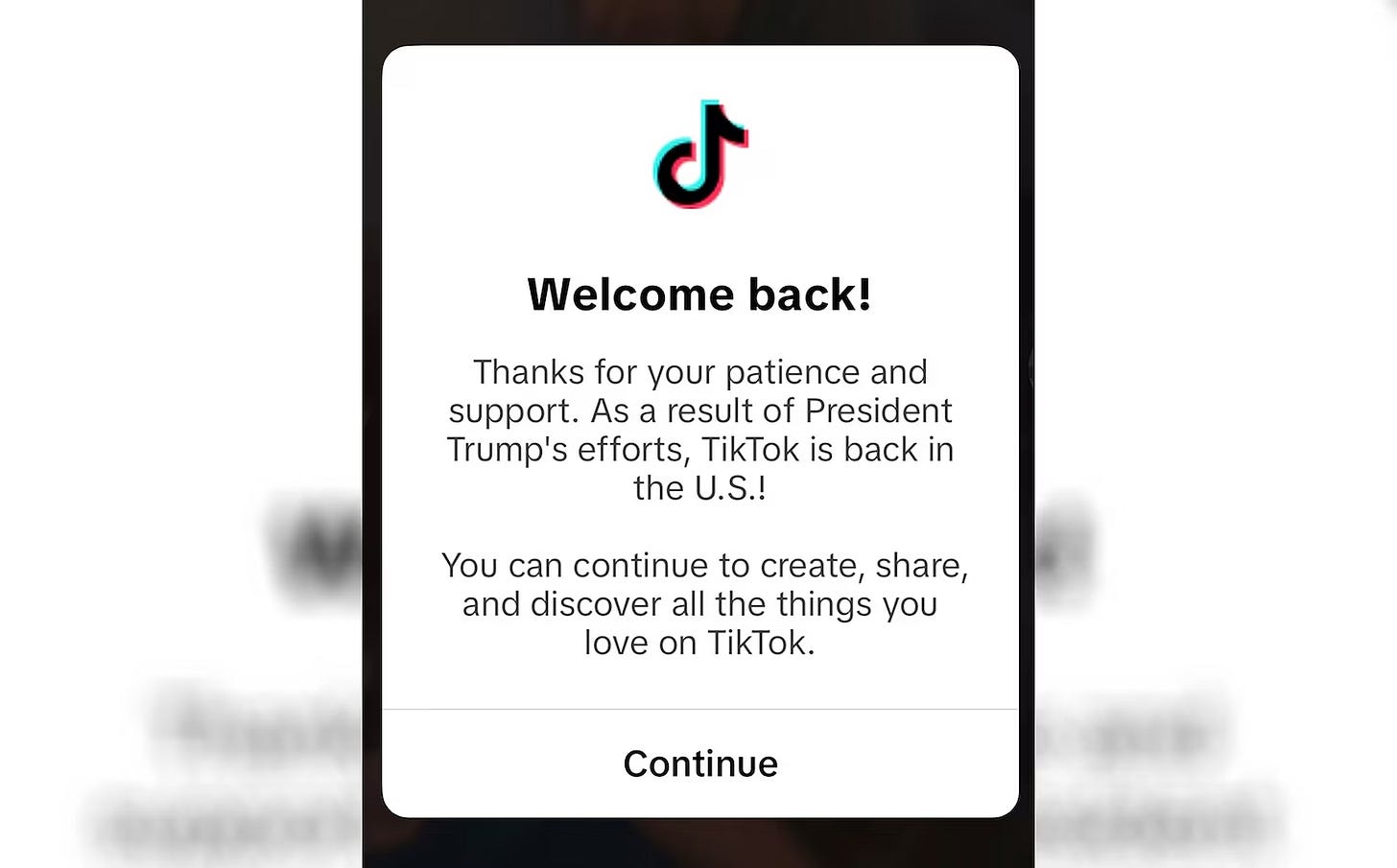Mad Libs: Gurri v. Demsas
No subtweeting allowed...
Welcome to Mad Libs. This is an irregular debate column where our columnists, contributors, staff writers, (or even you, dear reader) can duke it out over the big ideas we’re discussing in the metaphorical pages of this magazine.
Today’s Mad Libs was inspired by my column on Friday, “The case for staying on Twitter.” Unsurprisingly, it was not very popular on Bluesky, where Adam Gurri, editor-in-chief of Liberal Currents, dunked on me for not getting more likes when I posted my piece on Twitter. Sad!
He then pitched me on doing a Mad Libs debate on the topic. I accepted, and our conversation is below.
-Jerusalem
Adam Gurri, founder and editor-in-chief of Liberal Currents
Jerusalem Demsas defends her decision to remain on X by making the case that, even in our hopelessly polarized country, political persuasion still matters. I’d venture that virtually all authoritarian leaders throughout history would agree, since without fail, strongmen and dictators all move to suppress opposition media. In 1990s Peru, the Fujimori regime went so far as to pay TV stations more than 100 times as much as it paid judges and elected officials. Apparently, persuasion was more valuable than legal power.
X is not a compelling tool for mass persuasion. Video is our dominant modern medium, and even among the text-based social networks, X has always been one of the smallest. However, X has historically been a uniquely influential venue among elites. Demsas notes that “no other venue sees elected officials mingling with academics, Fortune 500 CEOs, and celebrities.” That is exactly why we need to continue beating the drum to get them off there.
Elon Musk’s ownership of X should not be underestimated as a problem. This is not about making him richer, though every dollar that goes into the platform makes it less of a financial burden for him to keep it. This is about Musk’s personal influence, which he recently leveraged to take de facto leadership over the executive branch for several months. During that time, his DOGE minions seized critical IT infrastructure in service of unilaterally laying off tens of thousands of federal workers, slashing spending on foreign aid, and cutting critical scientific research — a catastrophic assault on government that unfolded as it did thanks to Musk's unique combination of money and media power.
You are not going to effectively oppose the Trump administration from one of his lackey’s platforms, a platform whose reactionary owner openly dials up the reach of far-right content and makes it all but impossible to drive attention to off-platform content of any sort. We need to get those elite users — at least the ones not sympathetic to Trump — off that platform. This can’t be done one at a time if we’re going to crush the network externality. We need to aim for a bandwagon effect because for all practical purposes, either everyone who matters will leave or hardly anyone will.
This isn’t about avoiding the moral stain of complicity; this is about the practical steps required to actually resist the authoritarian consolidation currently underway. We need Democrats, journalists, academics, and celebrities who oppose the Trump administration to jump ship. We need better spaces to bring opposition voices to both the mass public and elite circles.
We are experiencing an attempted personalization of the executive branch, a clear step in the direction of authoritarian consolidation. Every authoritarian, without fail, moves to suppress any opposition in their country’s media system. Trump has been working on exactly that, in his typically direct and unsubtle manner.
Giving up X is not so big a sacrifice to ask for, given the stakes. There is a bigger world of information, communication, and persuasion than the world of X.
Jerusalem Demsas, The Argument editor-in-chief
In Gurri's ideal world, all of us who aren’t Nazis would evacuate from Twitter and reassemble on Bluesky, Threads, Mastodon, or some other entity. I agree! But it's not going to happen. When these competitors popped up, I too eagerly joined the eXodus. And each time, the effort failed.
A software engineer at Bluesky has been tracking usage statistics for the website and the results are not promising. Yes, Bluesky is a thriving little ecosystem, but its growth has clearly peaked.1
Why did it fail? In part because competitors had their various flaws, but I think mostly because network effects are really strong. The arguments that Gurri and others have made about Twitter have been made in many different contexts and venues. It is self-evident that they have not persuaded a large fraction of journalists, thought leaders, politicians, activists, and business leaders to leave the platform. So, what do we do in the face of this failure?
On the one hand, we have an incredibly biased platform that has the thumb on the scale for some of the worst ideas and movements produced by mankind. On the other, we have… the same?
It's here that I will note a bit of confusion that people who claim to be so worried about algorithmic manipulation are urging me to use Meta and TikTok2 as platforms of persuasion. Mark Zuckerberg has famously bent the knee to Trump, and there's evidence that China is suppressing anti-CCP content on TikTok. Some evidence indicates that TikTok amplifies the far right and was biased toward Republican content in the 2024 election. It already pushed a massive thank you notice to its users about President Trump.
Not to mention its willingness to go pretty far to suppress liberal content regarding China. According to a 2023 report by Rutgers University and the Network Contagion Research Institute3:
“In 2019, the Guardian reported that TikTok instructed its moderators to censor videos that mention Tiananmen Square and other topics sensitive to the Chinese Government.
In 2019, TikTok blocked an American teenager for highlighting the repression of China’s Uyghur minority (the account was later reinstated).”
Should liberals all delete their accounts on those platforms as well?
I'll refrain from making the hypocrisy point because I think what's really going on here is that people really hate being on Twitter. They hate being around Nazis and resent that it might actually be useful to continue using that platform for political purposes. Gurri asks me to make the sacrifice to leave Twitter, but that would be no sacrifice at all. The sacrifice is to stay.
Most importantly, I happen to think this is an incredibly important juncture in U.S. politics. People need to be posting right now. I'm glad Gurri concedes that, for elites, Twitter remains a central gathering place. The question then becomes whether the way elites’ minds change as a result of their time on Twitter will be better or worse if those on the left abandon it.
I think that the answer is obvious. Will my leaving Twitter cause it to collapse? No. Do people come across new information on Twitter? Yes. Do people come across new arguments? Yes.4 Is there a thumb on the scale for the right? Yes. Which, I'll note, looks like it predated Musk's tenure as CEO. Will that bias be worse if no one is pushing back on it? Yes.
The evidence indicates that the far-right has a megaphone, but that doesn't mean everyone else has no voice at all.








